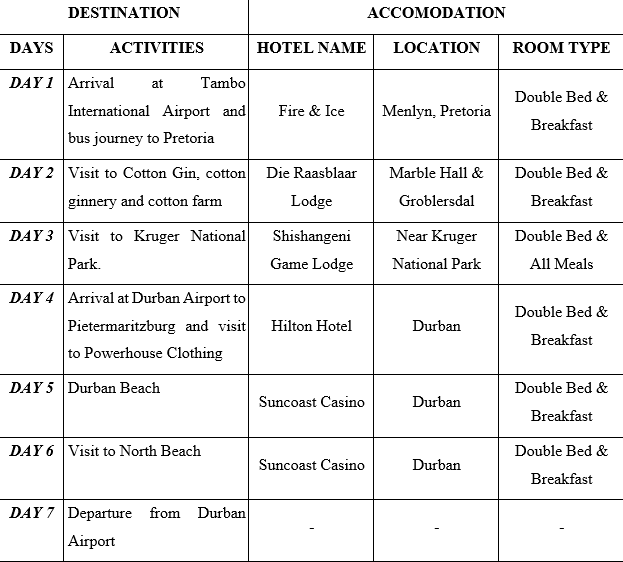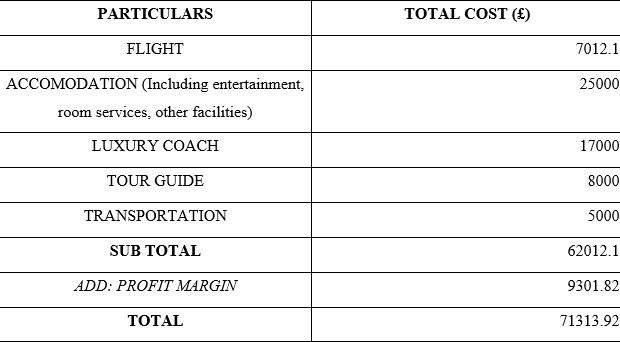INTRODUCTION
Tour operations management refer to development and execution of activities that are necessary for package holidays. Tour operators are responsible for handling the operations of these holidays. They are responsible to provide combined services of tours and travel industry and amalgamate the same in packages to enhance the experience of customers of tourists (Hoffman, Padberg and Rinaldi, 2013). The agenda of this management is to give consistent and outstanding services to customers of this industry and ensure their long term engagement with the tour companies. The report below is based on Audley Travel, which is one of the most trusted tours and travel company headquartered in Witney, Oxfordshire. The report covers a brief understanding of the tour operations industry within the travel and tourism sector along with the stages involved in creation of holidays. It also covers brochures, distribution methods for selling holidays and strategic and tactical decision-making for tour operators management
TASK 1
1.1. Analysation of the effects of current and recent trends on tourist operations industry
The tour operators industry of the UK is very vast in scale and continuously evolves and moulds itself according to the trends that are likely to affect its operations (Guo and He, 2012). Before understanding these trends, it is imperative to gain knowledge about different types of tour operators within the industry which are mentioned below:
- Inbound Tour Operators: The other name for these operators are 'ground operators' and they are local experts in specific location's tourism. They cater for all the inbound tourists from various other countries to the United Kingdom.
- Domestic Tour Operators: These operators provide their services to the residents of the country itself and within the boundaries of the UK. These tours are limited to various tourist attraction destinations that are present within the country.
- UK Outbound Tour Operators: These are another type of tour operators that are responsible for taking residents of one country to another for travelling purpose. They have no boundaries and provide their services all over the world.
There are various current and recent trends that influence the operations of tour operations industry. These trends are mentioned below:
- Technological Advancements: Tour operators industry in the UK, as well as the whole world, have been subjected to various technological advancements recently for instance Wi-Fi Technology, AI, Internet of Things (IoT), etc. These advancements have encouraged the industry to modify its functions and operations in providing services (Gibson, 2012).
- Responsible Tourism: With rise in environmental awareness and protection of wildlife, there are new policies and regulations in the industry promoting preservation of flora and fauna.
- Brexit Effect: One of the most recent and crucial events in the UK is Brexit. It had an impact on each and every industry in the UK. The reduction in the value of pound is attracting customers from almost everywhere in the world to visit the country. Post-Brexit, the industry contributed to a growth of 6.2% in the country's GDP in 2017 (Brexit news: British travel and tourism industry booming despite doomsayers’ claims, 2018).
TASK 2
2.1. Stages and timescales involved in developing holidays
To ensure comfort and enjoyment in the tour packages, it is imperative for tour operators to prepare itineraries that define the stages involved in development of holidays, along with the the timescale. As per the scenario, the chosen destination for holiday is South Africa. Below are the stages for the development of the holiday:
- Market Research: The first stage of developing a tour package requires extensive research of the market. This requires the trends, determination of locations with maximum tourist attraction, most suitable accommodation for customers, etc. This stage requires 2 months to be effectively executed.
- Planning and Scheduling: This stage undertakes determination of activities, accommodation, transportation and timescale for each location. Duration of development of this stage must be at-least a month.
- Contracting: After scheduling, the next step is establishing contracts with the suppliers which requires negotiation and signing contracts which gives a legal support in conducting the activities. This requires another 2 months to find best suppliers and coming into an arrangement with them.
- Costing of Holiday: Depending on the overall cost for suppliers and arrangements for the travellers, the next step needs the establishment of costs for the package. In this scenario, it includes the accommodation, heritage sites, beach stay and so forth. It requires a time of 45 days for the company to denote proper costing of activities (Evans, Stonehouse and Campbell, 2012).
- Financial Planning and Evaluation: Financial planning needs establishment of costs of services per person and evaluation of where the methods used are appropriate for the agenda of Audley. Proper financial planning and evaluation would take almost two and a half months for proper development.
- Creation of Brochure: After the above stages, the next step is creation of brochures to attract customers from all over the world.
- Advertising: Audley is required to use various methods of advertisements and promotions like internet, TV and print media to share their holiday idea with the rest of the world.
- Operations and Execution: This stage would need Audley to execute the plan effectively and manage the holiday of customers.
- Post Tour Management: This is the last stage in which feedbacks are collected by the company regarding the holiday with an attempt to establish long-term customer relationships (De Sausmarez, 2013).

2.2. Evaluation of the suitability of various methods of contracting for different components of the holiday and different types of tour operators
It is quite important for tour operators to fix their contract with hotels and airlines to provide comfortable transport as well as accommodation to the tourists. There are three type of contracts that are suitable for different type of operators. These are described below:
- Fixed Contract: This is the type of contract which is established on basis of high consumption. Under this contract, the operators provide a fixed package and specific offerings are provided to every customers under same pricing (Chon and Yu, 2012). The suitability of fixed contracts is most when the emphasis of operator is on maximising the sales. Its usefulness rises in the off-season where there are high risks of cancellations. Thus, it ensures that high risks generate higher returns.
- Allocation Contract: This contract refers to a pre-negotiated deals that tour operators make with hotels or airlines. The allotments under this contract could be bought for a certain span of time, for instance, the whole season. This is suitable for tour operators who tend to avoid risks of cancellation. This means, that in case the rooms in hotels or seats in the airline remain unoccupied, they could be returned back to their respective entities before an agreed time period.
- Ad Hoc Contract: The most flexible and appropriate manner in which resources could be arranged by the tour operators is provided by Ad Hoc Contract. The rates under this contract are set according to the activities on an hourly or daily basis. This further ease the pressure on the tour operators (Brown, Bessant and Lamming, 2013).
2.3. Calculation the selling price of a holiday from given information
It is imperative for Audley Travel to clearly calculate the selling price of their tour package to South Africa. This calculation includes all the aspects of the tours such as accommodation, transport, food and beverages (Al-Odeh and Smallwood, 2012). The customers of the tour package of South Africa requires to be transported by British Airways. Currently, British Airways are offering premium economy class seats for Heathrow Airport to Tambo International Airport at £350.00 for a single one-way trip. The return trip would be from Durban Airport which would be organised FlySafair Airlines which would charge £351.21, per ticket. The another type of transport would be buses to help the customers travel to various locations at ease. They would be staying in 5 star hotels like Hilton and Suncoast Casino. The firm expects a profit margin of 15%. There are 10 guests for which the price has to calculated. All these aspects are mentioned while calculating the selling price below:

TASK 3
3.1. Evaluation of the planning decisions taken for the design of the brochure
A brochure is a document that gives an information about the trips and tour packages by the tour operators with keeping emphasis on precision and creativity. For this, it is imperative that companies take wide scopes into consideration (Sigala, 2014). These scopes would help the firm in effectively attracting the customers as well as would help to determine the most appropriate distribution method for the company. Following is the evaluation of the planning decisions that must be taken by Audley Travels while preparing for brochures. These are mentioned below:
- Cost: The main emphasis of the firm while creating the brochure must be the cost. The cost of preparation of the brochure must be suitable for the firm as it is not necessary that each brochure brings in customers to the clients (Robinson and et. al., 2016). However, while determining the cost of development of the brochure, emphasis must be on the quality of the paper used. Also, the quantity produced must be specific in order to avoid wastage.
- Format: It clearly depends on the tour package of the company to whether develop the brochure in two-folds, three-folds or a booklet. For instance, in case of a week's trip, the firm could use a two-fold format while designing the brochure. Whereas, for a month's trip, three-folds format or booklets could be a viable option.
- Target Market and Budget: It is of vital importance that the target market of the firm to which they would send their brochures. Target markets would play a vital role for Audley Travels as the quality, design and creativity would be dependant on them completely.
- Determination of print specification: This means the design, quality of paper, font styles and so forth that serve the purpose of brochure. The font size used must be clearly visible to the readers as well as the fonts must not be too ambiguous for various customers to understand (Medlik, 2016). All these aspects must be taken into consideration while creating brochure.
3.2. Assessment of the suitability of alternatives to a traditional brochure for different types of tour operators
There are various alternatives to traditional brochures due to enhancements in technology and environmental concerns that serve different purposes for different tour operators. The suitability of these alternatives are mentioned below:
- E-Brochure: This newest trend allows firms to generate electronic brochures that could effectively be viewed by the customers on company websites. This is most suitable for companies who want to effectively save the cost of printing the brochures (Luis and et. al., 2012).
- Ipad/Android Application: This is another way of distributing brochures where companies use mobile application to distribute their brochures in public. The customers require to download the company apps on their phones and review the brochures provided by the company on their mobile screens. This is suitable for companies that want to stay ahead on technological upfront and spend a heavy amount on development and management of applications.
- Internet: Tour Operator companies use e-mails of their customers as a medium to provide brochures. They design and provide them in such a way that could easily be downloaded and viewed by the customers. The suitability for this method is most when companies have specific targeted customers who are loyal to the firm and the operations and effectively follow the packages provided by the company. It saves efforts as well as amount incurred in development and distribution of brochures (Kauppi and et. al., 2013).
- Social Media: This is the newest trend and is followed by almost all the big tour operators companies. Under this, the companies provide their brochures on social media platforms like Facebook, Instagram and so forth. This is suitable for almost all the tour operator organisation who wish to attract customers from all over the world.
3.3. Evaluation of the suitability of different methods of distribution used to sell a holiday for different types of tour operators
There are various methods through which the brochures are distributed which help tour operators to maximise their sales volume by effective distribution of their holiday packages. Some of these methods and evaluation of their suitability are described below:
- Direct Distribution: These are the methods used to sell the packages directly to the customers. The agenda of this method is to effectively sell the holiday to those customers who would surely accept the package and be a customer. This method works upon the assumption that the package would surely attract the customers in adopting the package, Thus, the deals are also presented in ways which successfully sell their holidays to the desired customers.
- Social network Website: This is one of the most adopted methods of selling holidays. It has no limitation and aims to attract a large group of customers by providing effective and amazing experiences. Moreover, the most suitable aspect of this method is that companies could effectively provide discounts to the customers and they could review their packages with others (Gass and Harris, 2012).
- Government Website: the most appropriate and standard method for companies to ensure that they definitely receive certain customers for their holidays. This is because the concept of safety is properly addressed as it is posted on government website. This increases its authenticity and helps operators sell their holidays successfully (Disch, 2016).
TASK 4
4.1. Strategic Decisions taken by various tour operators
The strategic decisions taken by various tour operators would depend upon various current and emerging trends in the UK industry. These trends are described below:
- Technological Advancements: This is one of the major emerging trend that induces the strategic decisions taken by the tour operator companies. Audley Travel is currently working on making its operations spread online that attract more customers in the UK. They must focus on using various AI and VR technologies that serve the purpose and enhance experiences of the customers. Thomas Cook on the other hand is using automated software and devices to ease the operations of payments, check-ins, etc. to attract more customers.
- Responsible Tourism: Audley, to follow this trend successfully and enhance the protection of environment, is working upon creating awareness through their websites on the importance of preservation of environment. Thomas Cook on the other hand are using electronic methods like mails, applications and so forth to provide the brochures which preserve trees by non-usage of paper and increase the protection given to the environment.
- Brexit Effect: Brexit has been one of the major events in the nation that has caused a severe effect on every tourism activities inside the country. The more adverse effects have been on the tourists within the countries who would be spending the vacations within the country (Dietz, 2011). Thomas Cook in this situation is enhancing the level of its services within the UK to attract more customers. Audley Travels must introduce services for customers inside the country to enhance their holiday experience.
4.2 Tactical decisions that could be taken by Audley in different situations
Tactical decisions are defined as the decisions are necessary to attain short term goals. It is imperative for these decisions to be appropriate as well as effective so that the goals be achieved in timely and accurate ways.
There are various situations where Audley Travels are required to take tactical decisions effectively (Chon and Yu, 2012). These situations are briefly described below:
SCENARIO 1
Audley Travels is aiming at strengthening their relationships with their customers present in the UK. To fulfil the need, the decisions taken by the firm are mentioned below:
- Tactical Responses: The response in this situation which is most appropriate for Audley is to acquire feedbacks from the customers in the nation which would help them to identify the areas where they are lagging behind in enhancing their experience.
- Tactical Pricing: For strengthening the relationships, Audley must adopt flexible and affordable prices for their customers in the UK to enhance their standard of living.
- Tactical Marketing: The marketing methods chosen must be those which are used and favoured by the customers within the country.
SCENARIO 2
Audley Travels, after Brexit, wants to provide cheaper services to customers within the country to travel outside the nation.
- Tactical Responses: The response of Audley must be to communicate to the suppliers that could help the firm achieve the purpose.
- Tactical Pricing: The pricing in this scenario must be on cost for customers to effectively afford it.
- Tactical Marketing: The methods used by Audley must communicate the agenda of the firm regarding the cheap pricing of the package.
CONCLUSION
Thus, it is concluded that tour operations management is necessary for the tour operators to enhance the experience of the customers. It is necessary to analyse the effects of the trends in the industry which impacts the operations by tour operator companies. The stages and the timescale must be clearly defined in order to smoothly organise the holiday packages. The contracting methods must be defined clearly to mitigate the risks associated with the operations. Planning decisions are imperative to be taken before developing the brochures. Lastly, it is required that effective tactical decisions be taken to serve the short-term operations effectively.
REFERENCES
Books and Journals
Al-Odeh, M. and Smallwood, J., 2012. Sustainable supply chain management: Literature review, trends, and framework. International Journal of Computational Engineering & Management. 15(1). Pp.85-90.
Brown, S., Bessant, J. R. and Lamming, R., 2013. Strategic operations management. Routledge.
Chon, K. S. and Yu, L., 2012. The international hospitality business: Management and operations. Routledge.
Chon, K. S. and Yu, L., 2012. The international hospitality business: Management and operations. Routledge.
De Sausmarez, N., 2013. Challenges to Kenyan tourism since 2008: crisis management from the Kenyan tour operator perspective. Current issues in tourism. 16(7-8). Pp.792-809.
Dietz, D. C., 2011. Practical scheduling for call center operations. Omega. 39(5).pp.550-557.
Disch, L., 2016. Representation. In The Oxford Handbook of Feminist Theory.
Evans, N., Stonehouse, G. and Campbell, D., 2012. Strategic management for travel and tourism. Taylor & Francis.
Gass, S. I. and Harris, C. M. eds., 2012. Encyclopedia of operations research and management science. Springer Science & Business Media.
Gibson, P., 2012. Cruise operations management: Hospitality perspectives. Routledge.
Guo, X. and He, L., 2012. Tourism supply-chain coordination: The cooperation between tourism hotel and tour operator. Tourism Economics. 18(6). Pp.1361-1376.
Hoffman, K. L., Padberg, M. and Rinaldi, G., 2013. Traveling salesman problem. In Encyclopedia of operations research and management science. (pp. 1573-1578). Springer US.
Kauppi, K. and et. al., 2013. Should we try out for the major leagues? A call for research in sport operations management. International Journal of Operations & Production Management. 33(10). Pp.1368-1399.
Luis, E. and et. al., 2012. Disaster relief routing: Integrating research and practice. Socio-economic planning sciences.46 (1). Pp.88-97.
Medlik, S. ed., 2016. Managing tourism. Elsevier.
Robinson, P. and et. al., 2016. Operations management in the travel industry. CABI.
Sigala, M., 2014. Customer involvement in sustainable supply chain management: A research framework and implications in tourism. Cornell Hospitality Quarterly. 55(1). Pp.76-88.
Online
Brexit news: British travel and tourism industry booming despite doomsayers’ claims. 2018. [Online]. Available through<https://www.express.co.uk/travel/articles/942732/brexit-news-latest-update-uk-travel-tourism-industry-boom/>.



















